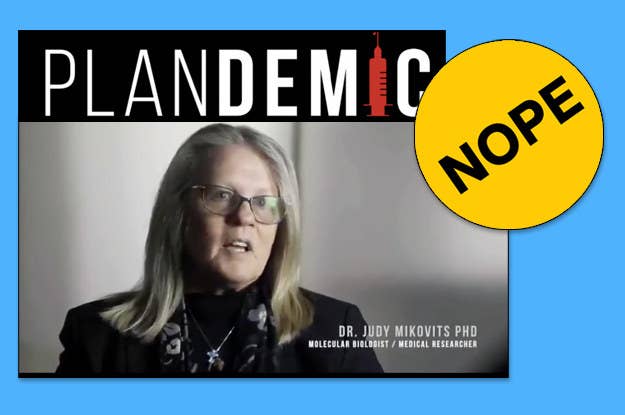
BuzzFeed News has reporters across five continents bringing you trustworthy stories about the impact of the coronavirus. To help keep this news free, become a member and sign up for our newsletter, Outbreak Today.
"The Plandemic," a video made to look like a professional news interview but in reality peddling long-debunked falsehoods about the coronavirus has spread widely on social media since May 4. The video features a woman, Judy Mikovits, who claims to have worked with Dr. Anthony Fauci, the immunologist at the helm of the National Institute of Allergy and Infectious Diseases.
“Now, as the fate of nations hang in the balance, Dr. Mikovits is naming names of those behind the plague of corruption that places all human life in danger,” says the narrator of the 30-minute video, in which Mikovits falsely claims that masks can make wearers sick, that sand from the beach can build up coronavirus immunity, and that as-yet-uninvented vaccines for the virus that has killed at least 75,000 people in the US are dangerous.
Mikovits has long been a figure in anti-vaccination communities, and has been attempting to insert herself into the COVID-19 pandemic narrative since late March, according to data from social media tracking tool BuzzSumo, with her breakout moment coming on May 6, two days after the video was initially published to Vimeo and YouTube.
On Thursday, Facebook, YouTube, and Vimeo all said they are removing the video from their platforms.
But the video’s spread has been swift. Aside from the video platforms, it could be found on Facebook, Instagram, Twitter, and even LinkedIn.
Produced by a company called Elevate, "The Plandemic" deftly weaves together several strands of rumors that have circulated since the beginning of the coronavirus outbreak, doing so with high production values and a sheen of unearned authority. It's not the first piece of viral content made by the man who produced it, Mikki Willis, who received media coverage in 2015 for buying his son an Ariel doll as a birthday present. In March 2019, Fox News covered his upcoming documentary about Nicholas Sandmann, the student at the center of the Covington Catholic High School controversy.
Mikovits herself is no stranger to accusations of false claims. In 2009, she published a study in Science on chronic fatigue syndrome that had to be retracted because it could not be replicated. She was fired from her job at the Whittemore Peterson Institute and brought up on criminal charges of theft of property and computer data, which were dropped in 2012.
That appears to be when Mikovits began to make unsubstantiated claims about Dr. Fauci. In 2014, she wrote a book in which she claimed that he personally barred her from the NIH premises, which he categorically denied to fact-checking site Snopes.
“I have no idea what she is talking about,” Dr. Fauci told Snopes in 2018.
Despite this past, Mikovits presents herself as a credible figure in the professionally filmed video. Unlike other conspiracy theorists, who can shout or ramble, Mikovits is composed and speaks calmly. Her air of reasonable cadence is bolstered by selective clips from news reports and an interviewer who appears curious and sympathetic.
And that effort has paid off: Her book Plague of Corruption: Restoring Faith in the Promise of Science is now a bestseller on Amazon. Her profile has grown in recent days, despite efforts by platforms to stop the video from spreading.
“We quickly remove flagged content that violates our Community Guidelines, including content that includes medically unsubstantiated diagnostic advice for COVID-19,” a YouTube spokesperson told BuzzFeed News. “From the very beginning of the pandemic, we’ve had clear policies against COVID-19 misinformation and are committed to continue providing timely and helpful information at this critical time.”
Vimeo, a video platform that also hosted copies of the video, also removed it from its website on May 7. “Vimeo stands firm in keeping our platform safe from content that spreads harmful and misleading health information. The video in question has been removed by our Trust & Safety team for violating these very policies. We are constantly monitoring and will continue to remove any similar videos uploaded,” a spokesperson told BuzzFeed News.
But Facebook groups were and continue to be the main vector for the inaccurate information to spread, with one version of the Plandemic video receiving nearly 4 million likes, shares, and comments, according to data from social media monitoring service BuzzSumo.
A Facebook spokesperson told BuzzFeed News that the site was removing copies of the video. "Suggesting that wearing a mask can make you sick could lead to imminent harm, so we're removing the video," the spokesperson said.
But as the video has been taken down, other copies have been uploaded to YouTube, Vimeo, and fringe video sites, allowing for a subsidiary narrative to take hold, however false: that a whistleblower is being censored.
“Once a video gets taken down, there’s a secondary appeal,” Renee DiResta, research manager at the Stanford Internet Observatory, told BuzzFeed News. “You see this a lot in crisis situations, where there’s a morbid curiosity audience and where they think they are fighting an anti-censorship battle.”
DiResta has been watching the false narrative bubble since April, witnessing it finally boil over in the last few days with the "Plandemic" video. She said its spread could be attributed to groups that deny vaccine science, falsely believe cellular technology can spread the virus, and support reopen protests across the country — and to one more ingredient:
“She’s going to be framed as a whistleblower," said DiResta, "and that’s because the whistleblower narrative really works.”
